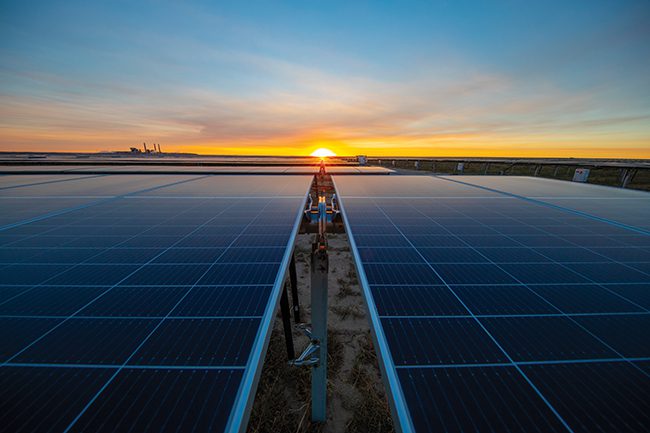Four Large-Scale Solar Projects Fined $1.34M for Alleged Clean Water Act Violations
Credit to Author: Sonal Patel| Date: Thu, 17 Nov 2022 14:44:15 +0000

The Environmental Protection Agency (EPA) and the Department of Justice (DOJ) have settled to resolve alleged violations of the Clean Water Act with four separate large-scale solar farm owners in Alabama, Idaho, and Illinois. The solar farm owners—all subsidiaries of large international finance and investment companies—used a common construction contractor for their farms.
The federal agencies on Nov. 14 said the four settlements—a combined $1.34 million in civil penalties—resolved violations of construction permits and stormwater mismanagement alleged in four separate complaints filed on Monday. The states of Alabama and Illinois joined in the Alabama and Illinois settlements.
The settlements cover a site owned by AL Solar A LLC near LaFayette, Alabama, and a site near American Falls, Idaho, owned by American Falls Solar LLC. They also include a site in Perry County, Illinois, owned by Prairie State Solar LLC, and a site in White County, Illinois, owned by Big River Solar LLC.
Each of the complaints alleges that the solar farm owners violated their construction stormwater permits in similar ways: “failing to design, install, and maintain proper stormwater controls; failing to conduct regular site inspections; failing to employ qualified personnel to conduct inspections; and failing to accurately report and address stormwater issues at the site,” the agencies said. The complaints filed against AL Solar and American Falls Solar “also allege unauthorized discharges of excess sediment from their construction sites to nearby waterways.”
Solar Construction’s Stormwater Management Problem
Solar farm construction “involves clearing and grading large sections of land, which can lead to significant erosion and major runoff of sediment into waterways if stormwater controls at the site are inadequate,” the agencies said. “Increased sediment in waterways can injure, suffocate, or kill aquatic life; damage aquatic ecosystems; and cause significant harm to drinking water treatment systems. To avoid these harms to the environment and public health, parties responsible for construction of solar farms are required to get construction stormwater permits under the Clean Water Act and comply with the terms of those permits,” they added.
The rare environmental enforcement actions relating to large-scale solar projects by the U.S. agencies follow an uptick of activity by some states to address mounting community concerns about ground-mounted solar’s impact on the regional landscape. Stormwater management, notably, is a key concern for the solar industry. The concerns are pegged to a substantial utility-scale solar expansion underway in the U.S. According to the Energy Information Administration (EIA), from June 2021 to June 2022, 17.6 GW of new utility-scale solar capacity came online, bringing U.S. utility-scale solar capacity to 65.8 GW. Based on planned additions, the EIA expects another 13 GW of solar capacity could come online by the end of 2022.
Stormwater runoff is generated from rain and snowmelt that flow over land or impervious surfaces, such as paved streets, parking lots, and building rooftops, and does not soak into the ground. Industry typically uses best management practices to prevent pollution from stormwater discharges. However, according to a recent review published in the journal Environmental Research: Infrastructure and Sustainability, the solar industry still lacks critical insight into whether solar farms change runoff generation, and whether existing site and stormwater management practices are adequate to prevent adverse impacts. While most states are authorized to implement the stormwater National Pollutant Discharge Elimination Systems (NPDES) permitting programs, the EPA remains the permitting authority in a few states and territories.
Hefty Fines
Construction of the AL Solar site in Alabama and the American Falls Solar site in Idaho is now complete and “permit coverage has been terminated,” the agencies said. The agencies said, however, that under a stipulation of settlement with AL Solar in the U.S. District Court for the Middle District of Alabama, AL Solar will pay a $250,000 civil penalty to the U.S. and a $250,000 civil penalty to the Alabama Department of Environmental Management (ADEM). Under a separate stipulation of settlement involving American Falls, filed in the U.S. District Court for the District of Idaho, American Falls will pay a civil penalty of $416,500 to the U.S.
Consent decrees reached with the two Illinois solar farms, however, will require Prairie State and Big River to ensure compliance with Clean Water Act permits until construction is complete. “In addition, Prairie State will pay a civil penalty of $157,500 to the U.S. and $67,500 to the state of Illinois, and Big River will pay a civil penalty of $122,500 to the U.S. and $52,500 to the state of Illinois,” the agencies said. The consent decrees were filed with the U.S. District Court for the Southern District of Illinois and are subject to a 30-day public comment period and final court approval.
“The development of solar energy is a key component of this Administration’s efforts to combat climate change,” said Acting Assistant Administrator Larry Starfield of the EPA’s Office of Enforcement and Compliance Assurance. “These settlements send an important message to the site owners of solar farm projects that these facilities must be planned and built in compliance with all environmental laws, including those that prevent the discharge of sediment into local waters during construction.”
The DOJ issued a similar message. “While the development of renewable energy holds great promise for combatting climate change, the solar energy industry must comply with the Clean Water Act,” said Assistant Attorney General Todd Kim of the Justice Department’s Environment and Natural Resources Division. “The proposed settlements demonstrate the Department of Justice’s commitment to require those developing these facilities, including the site owners, to comply with the law, or be held accountable for construction practices that put our waterways at risk.”
—Sonal Patel is a POWER senior associate editor (@sonalcpatel, @POWERmagazine).
The post Four Large-Scale Solar Projects Fined $1.34M for Alleged Clean Water Act Violations appeared first on POWER Magazine.